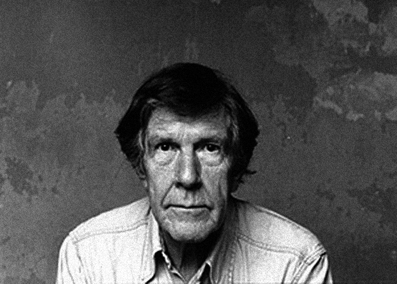Terebess
Asia Online (TAO)
Index
Home

John Cage (1912-1992)
"I have nothing to say, I am saying it, and that is poetry."
[Haiku]
There
are no secrets.
It's just we thought that they said dead
When they said
bread
Haiku. (1950-51) piano; 5 parts:
1. Haiku: For My Dear Friend, Who
2. Haiku: What Stillness
3. Haiku: The Green Frog's Voice
4. Haiku: The River Phurabelle
5. Haiku: [No Title]
Seven Haiku. (1951-52) piano
(used charts to Music of Changes; 5,7,5; space=time) {Elsa, Merle Armitage, Aghavni Uomini, Richard Lippold, Maro [Ajemian], Willem de Kooning, Sonia Sekula}, 1952.Cage's simplest keyboard work: the Webern-esque Seven Haiku (gorgeously nuanced and spaced) continues Cage's influence from Asian culture and philosphy. Here the brief movements are structured around the Haiku form, each movement consisting of three structural bars in a length relation of 5-7-5.
A chance determined piano work from 1951. Each Haiku is devoted to various persons in Cages life.
The Seven Haiku are composed using his chart technique for I Ching chance operations. The same charts as in Music of Changes were used, as well as the same method of notation, which is proportional where a quarter note equals 1 inch.
Each haiku is built around three measures of five, seven and five quarter notes each. Silence plays an essential role in these pieces.
The seven haiku are spaceous, with frequent chords. The attacks between different notes vary, sometimes fast and very sharp with no sustain, sometimes drawn out. Most interesting are the strange melodic fragments that show up, beginning with those in the third haiku. The fourth begins with what sounds like the start of a melody, but it goes nowhere. Such musical slices seem very common in the Haiku overall.Duration: 3' (every single piece lasts between 10-25 seconds)
Manuscript: Score (page proofs with corrections on title page - 7 p.) in New York Public Library.
http://brahms.ircam.fr/textes/c00000014/n00005415/index.html
http://www.answers.com/topic/john-cage-complete-piano-music-vol-4-pieces-1950-1960